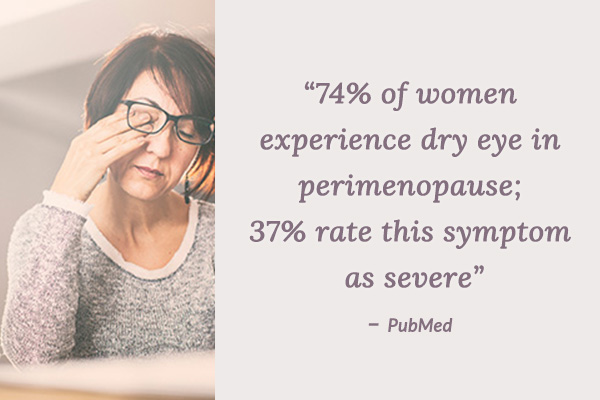Authored by Dr. Mary James, ND
Ringing in your ears? Weird bruises on your leg (even without smacking it on the coffee table)? A urinary tract infection (again) that leads to yet another prescription for antibiotics? These are all secret symptoms of perimenopause. You might find you have them along with the more common symptoms of hot flashes and irregular periods or as your only symptoms. But no matter how many symptoms you have, once you understand a little better what is going on with your body, you can relax a bit and also give it the little extra hormonal help it needs.

7 signs you may be perimenopausal
- Ringing in the ears. Your ears might be ringing — or maybe it’s more like a swishing sound in the ears in a pulsating rhythm. The sound may also be humming, buzzing or like waves crashing. A certain form of tinnitus (also known as ringing of the ears) is more likely for women in menopause. Research shows a woman’s hearing can be temporarily affected when progesterone levels are high, during the latter portion of monthly cycles.
- Heart palpitations. Heart palpitations can be an early symptom of perimenopause. They’re caused by increasing follicle stimulating hormone (FSH) as your body tries to stimulate ovulation. You may feel hot flashes or anxiety along with them — or not. When it comes to an irregular heartbeat, I recommend that you talk with your healthcare provider to make sure there’s no other reason you’re experiencing it.
- Tingling in the extremities. Getting all the nutrients we need is harder in menopause. And some nutrient deficiencies can lead to specific symptoms. Take Vitamin B12, for example. Without enough of it, you might feel tingling or numbness in your hands and feet (the same way they feel if they are going to sleep.) B12 deficiency is quite common. But testing for it can be tricky (blood B12 levels are sometimes normal despite being deficient within your cells). As a result, it can go undiagnosed. Here’s something else that may surprise you. You could be accidentally increasing your risk for low B12 levels by taking regular antacids. Since digestive difficulties often increase in perimenopause or menopause, many women start relying on antacids to calm their gas, bloating or heartburn. Unfortunately, in this case, trying to find relief for one symptom can create another. Luckily, there are many natural options to help you reduce digestive difficulties.
- Clumsiness and bruising easily. You may understandably blame any new and noticeable lack of coordination on not ever getting enough sleep or brain fog, which are both better-known menopause symptoms. But clumsiness (bumping into things, needing to avoid anything breakable, tripping and loss of balance) is also its very own symptom. You may have noticed this as part of your PMS. But it can also appear for the first time as part of perimenopause. Increased clumsiness can make bruising — another common symptom of perimenopause — occur even more. You may even bruise so easily that you don’t remember how the bruises got there. This can result from changes in hormones or from differences in the amount of nutrients you’re getting in your diet.
- Dry mouth and dry eyes. Changes to your estrogen levels can cause dry mucus membranes in general, including in your mouth and eyes. When you first experience dry mouth, you may think you just need to up your water intake (which most of us indeed should do). But when your dry mouth is related to perimenopause, even drinking eight glasses of water or more a day might not seem to help. If you’re suffering from dry eyes, your eyes may feel itchy, scratchy, increasingly tired during the day or extra sensitive. A lot of screen time makes this worse, since while staring at the screen we forget to blink (which moistens the eyes).
- Gum and teeth problems. Issues with your gums and teeth can really take off as menopause approaches. One possible cause, especially of receding gums, is increased low-grade inflammation in the body in menopause. Another common cause is declining levels of estrogen. This compromises your bone density in general, including the bone in your jaw surrounding the teeth.
- Urinary issues. I had problems with urinary incontinence every time I Iaughed or sneezed. I was so frustrated. I mean, I was “freshly menopausal” and thought this was a horrible sign that things were going to get worse. At that point, I didn’t completely understand estrogen’s beneficial effect on urinary tract tissues. But it’s dramatic!
Just as lower estrogen levels cause vaginal dryness, your urinary tissues (including the sphincter) can become thin and more sensitive. The bladder becomes much more susceptible to infections. Because everything happens on a continuum, you may find yourself feeling uncomfortable even if you haven’t been diagnosed with a urinary tract infection. Changes in your sphincter can lead to more incontinence, as well as a loosening of internal structures such as the ligaments that hold up the uterus, especially if you’ve had children.
You don’t have to be frustrated with how you feel
There’s no doubt that your body goes through a lot of changes in menopause. But I firmly believe that all of the symptoms above — as well as others you’ve heard about — aren’t inevitable. What’s more, there are effective natural options that can help resolve the root cause of all your symptoms, not just the well-known ones!
 | If you’re feeling frustrated with how you feel, or you want to learn more about your symptoms, take our Menopause & Perimenopause Quiz to find out more. |











